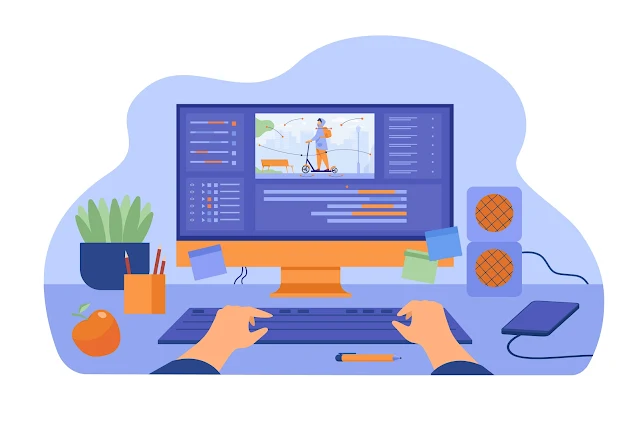Introduction
Video editing is the process of rearranging, cutting and assembling video footage to create a cohesive story.
It's an important role in the world of television and film production, as well as other industries like corporate and educational video.
A career in video editing requires a combination of technical skills and creative vision, offering exciting opportunities to work with a range of clients and projects.
Education and Training
Video editing is a rewarding and creative career, but it can also be quite technical.
To become a successful video editor, you'll need to have a solid understanding of the technical aspects of the job as well as the artistic elements. Here are some tips on how to get started with a career in video editing:
- Take a course in video editing. Most colleges and universities offer courses in video editing, including basic editing techniques, color correction, and sound design. This will give you a foundation to build your skills on.
- Learn the software. To be a successful video editor, you'll need to be proficient in a variety of software programs, such as Adobe Premiere Pro, Final Cut Pro X, and Avid Media Composer Also For Mobile There's InShot Pro. Spend time practicing with these programs to become familiar with the tools and features.
- Get certified. Many software companies offer certification programs for their editing programs. Taking a certification course will help you stand out from the competition and demonstrate your expertise in the field.
- Keep up with new technologies. Video editing technology is ever-evolving, so it's important to stay up to date on the latest trends and techniques. Read industry blogs, attend seminars, and watch tutorials online to stay current on new technologies and techniques.
- Network. Networking is an important part of any career, and video editing is no exception. Attend industry events and join professional organizations like the Digital Video Editors Association to connect with other professionals in the field.
- Gain experience. To get a job in video editing, you'll need to have experience. Look for internships or volunteer positions at local TV stations, film studios, or video production companies to gain experience and build your portfolio.
- Consider freelancing. Freelance video editing can be a great way to gain experience and build a client base. Look for freelance jobs on websites like Upwork or Guru to get started.
By following these tips, you'll be well on your way to starting a successful career in video editing. Good luck!
Job Outlook
The job outlook for video editing is positive. According to the Bureau of Labor Statistics, employment for multimedia artists and animators, which includes video editors, is projected to grow by 4 percent from 2019 to 2029.
This is about as fast as the average for all occupations. The demand for multimedia artists and animators is expected to increase as companies continue to produce more videos for a variety of digital platforms.
According to the Bureau of Labor Statistics, the median salary for video editors is around $40,000 per year.
Career Paths
Broadcast Video Editor: Broadcast video editors work in television and radio studios, creating and editing video and audio content for broadcast. Responsibilities include cutting footage, selecting visuals and music, and integrating special effects.
Corporate Video Editor: Corporate video editors are responsible for creating videos for company use. This may include product demonstrations, training videos, web content, and promotional materials.
Freelance Video Editor: Freelance video editors work independently, taking on projects from a variety of sources. They are typically responsible for all aspects of video production, including pre-production, shooting, and post-production.
Music Video Editor: Music video editors work with musicians and record labels to create music video content. Responsibilities include creating a storyboard, selecting visuals and music, and editing footage.
Post-Production Video Editor: Post-production video editors are responsible for the final stages of video editing. This includes color correction, sound design, and special effects.
Sports Video Editor: Sports video editors are responsible for creating videos that capture the highlights and excitement of sporting events. Responsibilities include selecting footage, adding graphics, and creating a narrative.
Important Skills
Storytelling: A video editor should be able to tell a story with their footage and understand how to best capture the emotion of each moment.
Technology: A video editor should be comfortable with the technology of video editing, such as the different types of software and hardware that are used.
Patience: It takes a lot of time and effort to refine footage and make sure everything looks just right. A video editor should have the patience to go through the footage multiple times.
Attention to Detail: A video editor should be able to identify small problems in the footage, such as audio problems or visual imperfections.
Creative Thinking: A video editor should be able to think creatively and come up with new ideas to make the video more visually appealing.
Organization: A video editor should be organized and have a system for keeping track of footage, audio, and other elements.
Collaboration: A video editor should be comfortable working with other people, such as directors or producers, in order to make sure the video turns out the way they envisioned.
Conclusion
A career in video editing is an exciting opportunity for those looking to combine technical and creative skills. With a growing demand for video content, there are a range of career paths for video editors to explore. To be successful, video editors should hone their technical and creative skills, as well as their ability to collaborate with others.
Rate This Article
Thanks for reading: How to Make Money as a Video Editor In 2023, Stay tune to get latest Blogging Tips.
